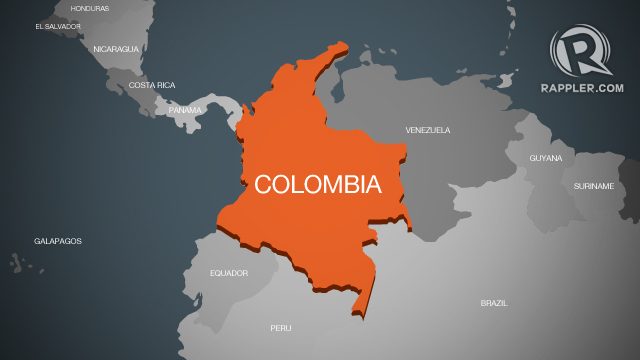SUMMARY
This is AI generated summarization, which may have errors. For context, always refer to the full article.

QUIBDO, Colombia – The highly anticipated handover of a general and four other hostages captured by FARC guerrillas got underway Thursday, November 20, Colombian President Juan Manuel Santos said, paving the way for the resumption of peace talks.
“The procedure is underway,” said the president, referring to the release of General Ruben Alzate and four other army captives being held by the Revolutionary Armed Forces of Colombia.
Colombia had suspended peace talks with the rebels over Alzate’s capture.
Officials provided few immediate details on the handover, saying only that a deal was reached Wednesday to free the hostages “as soon as possible.”
If the handover goes smoothly, Santos should be able to resume the two-year-old negotiations in Cuba on which he has staked his presidency.
“I’m going to give instructions for negotiators to return to Havana and continue talks, hopefully at a good pace, so they can finish this process as quickly as possible,” Santos said.
The Red Cross, which the government asked to intervene in the standoff, has a “green light” to oversee the hostages’ release, local spokeswoman Patricia Rey said.
The FARC for its part called its decision to release the hostages “a great gesture” that would save the talks.
“What we’re doing is a great gesture of peace, reconciliation, good will and commitment to the peace process,” said the guerrillas’ third in command, Jorge Torres Victoria, alias Pablo Catatumbo.
He repeated the FARC’s demand for a bilateral ceasefire to stop further “incidents of war” from derailing the negotiations.
The government has so far rejected calls for a ceasefire, which Santos argues would strengthen the rebels’ hand.
Conflicting accounts of capture
General Alzate, the head of an army task force charged with fighting rebels and drug traffickers in the jungle-covered department of Choco, is the highest-ranking officer to be captured by the FARC in 50 years of conflict.
He was taken hostage along with Corporal Jorge Rodriguez and army adviser Gloria Urrego as they traveled by boat to visit a civilian energy project in the remote western region.
FARC fighters were already holding two other soldiers captured in combat in the eastern department of Arauca on November 9, Paulo Cesar Rivera and Jonathan Diaz.
Diplomats from Cuba and Norway, two of the countries acting as guarantors of the peace process, announced Wednesday that a deal had been struck to free all five hostages, but gave few details.
The defense ministry says Alzate, 55, was ambushed by armed guerrillas on arrival in the village of Las Mercedes.
But questions have emerged about why he was apparently traveling in civilian clothing and without a security escort.
Local residents denied Thursday that he had been ambushed, casting further uncertainty on an incident that derailed the controversial peace talks just as they reached their two-year anniversary Wednesday.
“Four men dressed in civilian clothes arrived in a boat about half an hour before the general,” said resident Presentacion Palomeque.
“They sat on the benches in front of the church. When the general and his companions arrived, they all met there and talked. The next time I looked, they were all leaving on a boat.”
Palomeque said he had not seen any gunmen.
“It scares us when they say that stuff,” said the 37-year-old father of 12, recalling that the entire village had to flee 15 years ago when it came under attack by right-wing paramilitaries.
The attacks were sparked by an army corporal who had said that nine members of the since-disbanded paramilitaries had been captured “with the community’s help.”
Choco has been one of the regions hardest hit by the conflict, which has killed more than 220,000 people and caused more than five million to flee their homes since the FARC was founded in 1964.
Numerous rebel groups, drug gangs and illegal mining operations flourish in the hard-to-reach, densely forested department, whose population is overwhelmingly poor and black.
Local Catholic bishop Juan Barreto said that this year alone 8,000 people in the area had fled their homes to escape violence. – Rappler.com
Add a comment
How does this make you feel?
There are no comments yet. Add your comment to start the conversation.